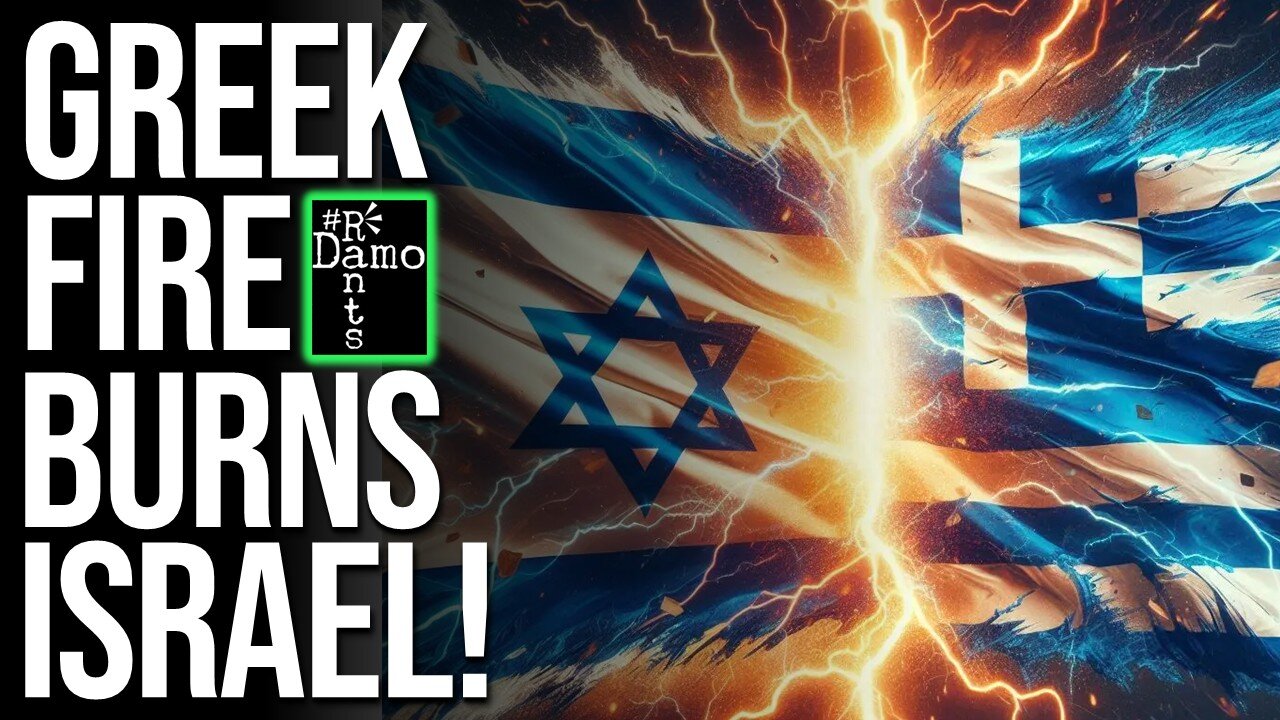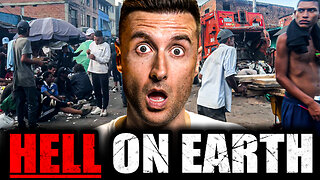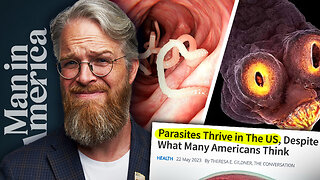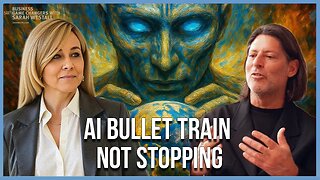Premium Only Content

They Wanted Silence — Athens Mayor Gave Them Fire
Right, so as news once again broke on Sunday of dozens more Palestinians becoming victims of Israel’s genocidal actions—many while queuing for humanitarian aid—Israel’s ambassador to Greece, Noam Katz, took to the press to express a deep diplomatic grievance. His complaint was not about the actions of his state against the people who’s land they illegitimately occupy, nor about the use of starvation as a weapon of war, nor about the siege imposed by his own government. It was about graffiti. Specifically, Katz was condemning anti-Zionist slogans graffitied on a wall in Athens—graffiti that had actually already been removed by city authorities. For Katz, the real outrage wasn’t in Rafah’s refugee camps or in the bombed ruins of Gaza City. It was in a can of spray paint in the Greek capital, the work of which was already gone. Manufactured outrage 101.
However, the mayor of Athens, in stark contrast to the Greek national government, Haris Doukas, wasn’t having a bar of this. He turned around and gave Noam Katz the treatment by saying: “We will not take lessons in democracy from those who kill civilians.” Where national governments have cloaked genocide in euphemism and equivocation, out of moral cowardice and treating Israel as different, as Zionists wish things to be, Doukas spoke with unapologetic clarity in a manner Israel still can’t get used to and their response is what has driven this story to go somewhat viral. The confrontation between Doukas and Katz encapsulated the obscenity of a diplomatic order where the sensibilities of genocidal states are defended more vigorously than the lives of their victims, but more and more, people, including elected officials like Doukas, aren’t having it anymore.
Right, so Haris Doukas’s response to what is a pretty lousy attempt at distraction in my view, an Israeli official once more expressing how they have been harmed by something whilst their nation literally commits genocide is another crack in the global discourse surrounding Israel’s actions in Gaza—a moment where moral clarity triumphed over the manipulative rhetoric of civility. It situates this incident within the broader context of Israel’s genocidal war on Gaza, the strategic weaponisation of antisemitism, and the silence of European governments. In doing so, it shows how the power of municipal leadership can restore ethical boundaries within an international community that has, by and large, abandoned it and this is as true in Greece with their national leadership as it is in so many other European states.
While Noam Katz was fulminating over graffiti in Athens that had already been removed by the time of his complaint, Gaza was bleeding. On the same day—August 3—at least 40 Palestinians were killed by Israeli fire, including more than 30 at aid distribution points in central Gaza. According to Reuters, shroud supplies were so limited that children were being wrapped in makeshift sheets as they were buried in shallow graves under siege conditions. Food convoys were again prevented from entering Rafah and Khan Younis, while airdropped aid was confiscated by Israeli-backed militia groups operating in buffer zones.
Among the dead were six children who had starved to death in makeshift shelters after being cut off from medical care. Their deaths brought the total number of famine-related deaths in Gaza to more than 175 since Israel’s full blockade intensified in May. The United Nations Relief and Works Agency (UNRWA) confirmed that over 1.2 million Gazans were now entirely dependent on irregular and unsafe airdrops, with children and the elderly disproportionately affected.
This is not a “conflict.” It is not “warfare.” It is not a “complex situation.” It is mass death. It is the deliberate targeting of civilians, the use of starvation as a weapon, and the systematic destruction of civil infrastructure.
Gaza’s health system has collapsed, with makeshift field clinics running without anaesthetic, clean water, or electricity. Doctors have been forced to amputate limbs without painkillers, and infants born prematurely are dying in incubators with no fuel. Satellite images and verified video footage show razed neighbourhoods, mass graves, and bombed UN facilities. These atrocities are not speculative—they are recorded, published, and denounced by international humanitarian law experts. That they continue uninterrupted is a testament to the complicity of global power structures that allow such crimes to unfold without meaningful consequence.
The situation has grown so dire that humanitarian organisations have begun to describe Gaza as “uninhabitable.” The World Health Organization has lost contact with more than 60% of its staff in the Strip, while UN OCHA officials have repeatedly been denied access by Israeli authorities. Satellite imagery confirms the near-total erasure of civilian infrastructure in northern and central Gaza. Thousands are missing and presumed dead under rubble. 10% of Gaza’s population cannot be accounted for. Western governments have responded not with sanctions, but with platitudes. The United States and United Kingdom continue to supply arms and diplomatic cover, while the European Union has largely remained frozen between rhetorical concern and unforgivable inaction.
And yet, while these deaths were occurring, Katz’s diplomatic bandwidth was occupied by defaced masonry.
According to The Jerusalem Post, Ambassador Katz condemned the appearance of what he referred to as antisemitic graffiti in Athens, claiming it reflected a hostile climate toward Israeli tourists and investors. He characterised the slogans as incitement to violence and demanded that the Athens city government issue an official apology and take stronger measures against what he described as “anti-Israel extremism.” This narrative was picked up by Israeli media outlets including Haaretz, Times of Israel, and i24News, all of which framed the incident as evidence of rising European antisemitism.
However, several key facts undermine this framing. First, the graffiti in question had already been removed before Katz’s comments were made public. Second, the slogans—while certainly inflammatory were against Israel and against Zionists. Not against Jews, at least none of the source material I’ve seen mentions any such comments, which absolutely would be antisemitic, but here, based on what I’ve seen, to call them antisemitic would be to conflate Israeli criticism with antisemitism, a failing of the IHRA definition as that is because it allows that conflation to be made and Israel cannot be above reproach for what it is doing now and has been doing for decades, the graffiti had not been linked to any violent action, and the city authorities had taken appropriate steps to remove it as any unwanted graffiti would be. Third, there is a glaring contradiction in Katz’s claim that Israelis feel “unsafe” in Athens, while the Israeli upper-middle class has been flooding the Greek real estate market, particularly in Athens and Thessaloniki. Israeli property purchases under Greece’s Golden Visa scheme have increased by some 90%.
Katz was not therefore reacting to a real security threat. He was executing a tired old strategic play from the Israeli playbook: using the language of antisemitism not to protect Jewish safety, but to shield Israeli impunity from criticism. By focusing international attention on a wall that had already been scrubbed clean, Katz sought to divert moral outrage away from Gaza’s mass graves and toward a narrative of Israeli victimhood.
Therefore Haris Doukas did not merely defend Athens from an unfair diplomatic accusation—he reasserted the primacy of moral judgement in political life. Doukas declared on Twitter by way of response that:
‘We do not accept lessons in democracy from those who kill civilians. Athens, the capital of a democratic country, fully respects its visitors and supports the right of free expression of its citizens. As the city's municipal authority, we have proven our active opposition to violence and racism and we do not accept lessons in democracy from those who kill civilians and children in food lines, from those who lead dozens of people to death every day in Gaza, from bombs, hunger and thirst. It is appalling that Mr. Ambassador focuses only on graffiti (which is obviously being erased), while an unprecedented genocide is being carried out in Gaza. Let me also inform Mr. Ambassador that in the last year the number of Israelis who have been granted a Greek Golden Visa has increased by over 90%.’
Doukas’s statement resonated so deeply because it was unflinching, you can feel the anger in his words at the slight Israel has casually thrown at his city in their ongoing determination to cover their actions with as much propaganda as it takes. It also exposed the utter lack of diplomatic morality that has come to define much of Europe’s response to the Gaza genocide. Where other leaders offer boilerplate calls for “de-escalation,” whilst doing nothing to actually achieve it, Doukas named the horror and laid down a damning and deserved response. Where others blurred the line between critique and complicity, he drew it sharply. In the context of an international environment that punishes those who speak the truth about this grave and frankly avoidable situation and rewards euphemism, Doukas’s defiance has become a global moment of reckoning.
While Haris Doukas spoke with clarity, acted as a leader in defence of his city, his people in the face of a pathetic attempt at winning back the optics of what is actually happening in Gaza at Israel’s hand, the Greek national government remained conspicuously quiet and this does not make them look good at all. Prime Minister Kyriakos Mitsotakis and his New Democracy party made no public comment in support or condemnation of either Katz’s accusation or Doukas’s response. This silence, in many ways, spoke volumes. It reflected a government trapped between strategic alliances with Israel—driven by military, energy, and intelligence cooperation—and a growing domestic discontent over Israel’s actions.
In contrast, Greece’s opposition parties responded with a unified front. SYRIZA, PASOK, and the Communist Party all backed Doukas, you’d expect PASOK to at the very least, this is Haris Doukas’s own party. SYRIZA expressed full support for Doukas, while the Greek Communist Party stated that the public in Greece overwhelmingly supports the Palestinian cause, certainly we’ve seen that in places like Syros and Rhodes and pledged to continue public demonstrations, large examples of which have been seen in cities such as Athens. against Israeli military operations.
Ambassador Katz’s rhetorical strategy was not unusual. It follows a well-established pattern whereby criticism of Israeli state violence is recast as antisemitic incitement. This conflation has been well documented now and criticised by numerous scholars and human rights bodies. The International Holocaust Remembrance Alliance (IHRA) working definition of antisemitism—widely adopted as it has been in Western democracies—has itself been used as a tool to suppress Palestinian advocacy, that conflation I mentioned a moment ago. Francesca Albanese, the UN Special Rapporteur on the occupied Palestinian territories, has warned that this instrumentalisation of antisemitism “undermines real efforts to combat racial hatred” by blurring the line between racism and political accountability.
The real danger of this rhetorical sleight-of-hand is that it delegitimises both the fight against antisemitism and the global struggle against apartheid and genocide. By painting critics as bigots, the Israeli government immunises itself from scrutiny. This strategy not only protects a regime of oppression—it actively criminalises the language needed to oppose it. When Doukas condemned Israeli war crimes, he was immediately framed in some quarters of the Israeli press as enabling hate speech. Yet his remarks did not target Jews or Judaism—as I’ve also said already, I haven’t heard or seen an example of the graffiti that did that either, though I stand to be corrected, they targeted a state apparatus that is engaged in mass killing. To conflate the two is not only dishonest—it is politically dangerous.
As for the party Doukas is a part of, he is a member of PASOK, a centre-left party with a long history of internationalism, anti-fascism, and solidarity with anti-colonial movements. In the 1980s, under Prime Minister Andreas Papandreou, PASOK was one of the few European parties to openly support the Palestine Liberation Organisation, the PLO. It opposed NATO’s more hawkish positions and sought an independent path for Greece in global affairs. Doukas’s statement thus reflects not only a personal conviction, but the politics of his own party too.
Greece’s left has always understood what it means to live under foreign domination. From the Nazi occupation to the military junta, the Greek people have fought back against authoritarianism. That legacy infuses PASOK’s stance on Palestine. It explains why Greek activists were early participants in the Gaza Freedom Flotilla, and why Greek trade unions and student groups have consistently mobilised against Israeli war crimes. In this context, Doukas’s words are not radical at all—they are consistent with a deeply rooted historical tradition, that sadly isn’t being reflected in its current national government.
Doukas joins a growing list of municipal leaders who have taken bold positions against Israeli apartheid in the absence of meaningful state-level action. Barcelona cut ties with its twin city of Tel Aviv. Dublin passed a motion declaring Israel an apartheid state. Liège, Oslo, and Geneva have all seen city council votes demanding sanctions. These cities are not anomalies—they are the new frontlines of moral leadership. It’s happening at municipal level within multiple states as national government sits on its hands. Freed from the constraints of international diplomacy, mayors and local councils are responding directly to the ethical demands of their populations.
This municipal revolt reflects a deeper truth: the global political class is increasingly out of step with its citizens. As civil society grows more outraged by images of bombed hospitals and starving children, national leaders retreat into language about “security concerns” and “complex dynamics.” But cities are closer to the ground. They see protest movements. They feel public pressure. They are, in many ways, the last responsive institutions in a political system paralysed by strategic interests. Doukas’s statement is not just a personal act—it is part of a broader reclamation of moral clarity from the debris of international diplomacy.
Therefore the real scandal was not the graffiti on a wall in Athens. It was the spectacle of a state representative attempting to transform paint into a more urgent crisis than the starvation of children. The Israeli ambassador’s outrage was a deliberate distraction from atrocity. That a Greek mayor had the courage to call it out is not something to be criticised—it is something to be celebrated, and emulated.
When diplomacy becomes a tool to protect genocidaires, and when silence is demanded of those who see clearly, moral responsibility shifts. It moves from states to cities, from ministers to mayors, from protocol to principle. Haris Doukas spoke truth to power as we all should—and in doing so, he reminded the world that some truths are too urgent to whisper. They must be shouted, even if they offend someone’s delicate sensitivities. Especially if they offend.
Besides, if Israel wants to be offended about something, you’d imagine their own hostages and their own government not getting them out would be a bigger issue, especially when their heritage minister wants said hostages to be classified as PoW’s so Israel can legitimately ignore them until after they have defeated Hamas. And there was me thinking the whole reason for Israel to invade Gaza was to get them back? Get all the details of the outrage caused by this horror of a minister and the backlash he’s triggered in this video recommendation here as your suggested next watch.
Please do also hit like, share and subscribe if you haven’t done so already so as to ensure you don’t miss out on all new daily content as well as spreading the word and helping to support the channel at the same time which is very much appreciated, holding power to account for ordinary working class people and I will hopefully catch you on the next vid. Cheers folks.
-
 28:46
28:46
DeVory Darkins
13 hours ago $14.38 earnedPritzker HUMILIATED after brutal fact check as Democrat candidate calls for political assassination
16.1K88 -
 19:54
19:54
Forrest Galante
10 hours agoPrivate Tour Of America's Best Marine Animal Facility
28.2K7 -
 9:25
9:25
MattMorseTV
1 day ago $17.63 earnedSupreme Court just DROPPED a NUKE.
26.1K66 -
 13:25
13:25
Nikko Ortiz
1 day agoWorst Karen TikTok Fails
27.2K10 -
 40:24
40:24
The Connect: With Johnny Mitchell
2 days ago $21.88 earnedInside The WORST Drug-Infested Slums Of Medellin, Colombia
68.9K29 -
 4:14
4:14
GritsGG
16 hours ago2 Warzone Easter Eggs! How to Find Them EASILY!
21.4K1 -
 LIVE
LIVE
Lofi Girl
2 years agoSynthwave Radio 🌌 - beats to chill/game to
382 watching -
 1:45:43
1:45:43
Man in America
16 hours agoThe DISTURBING Truth About Parasites — Live Q&A w/ Dr. Jason Dean
88.2K40 -
 7:13:47
7:13:47
SpartakusLIVE
13 hours ago#1 Mountain of Muscle with HUGE Legs saves your weekend from complete BOREDOMNight HYPE
51.6K1 -
 47:42
47:42
Sarah Westall
13 hours agoFreedom or Slavery? AI will Change Everything w/ Trump Senior Advisor Marc Beckman
69.9K16
